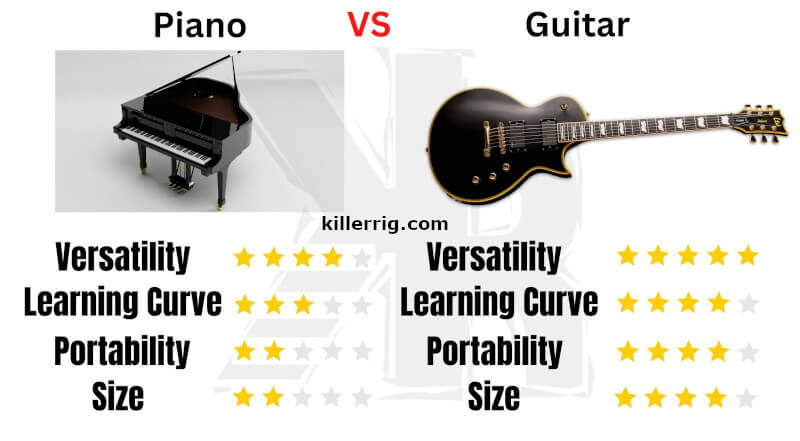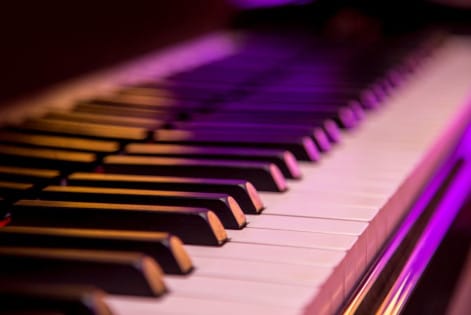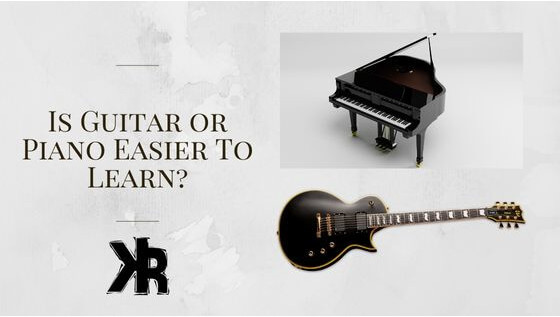Table of Contents
Getting started with a musical instrument can be a rewarding and enriching hobby. But for some, it can also be really intimidating! Especially if you are just starting out. One question that often comes up for beginners, is guitar or piano easier to learn.
The quick answer is that the piano is simpler when getting started. This is because pressing a key on the piano provides a clear, well-defined note. When compared to the guitar, you must press the string just right to get a note that sounds good.
This takes more skill and accuracy. Yet, as you progress with each instrument, the piano then becomes more difficult.
In this Killer Rig article, we will explore the benefits and challenges of each instrument. As well as the learning curves beginners will face when getting started.
By the end, you should have a better understanding of each instrument. Then you can decide if the guitar or piano might be the better choice for you.

Is Guitar or Piano Easier to Learn?
The initial learning curve can be steep for both the guitar and piano. Both instruments need a certain amount of finger strength and dexterity. As well as the proper technique to produce a good sound.
Yet, more people find that the piano is easier to learn in the beginning. This means that the guitar is a bit harder than piano initially.
One reason for this is that the piano has a fixed layout of keys. Each key has a consistent distance between them. Pushing one generates a specific and clear tone.
This can make it easier for beginners. Especially with basic concepts of music theory and playing simple melodies.
The guitar differs significantly. It has strings that need to be pressed against frets. But they must be pressed with accuracy in order to produce the sound of the note you desire.
A new player would face a considerable challenge because of this. Getting used to the concept of guitar frets is no simple task.
Yet, as players progress, the piano then becomes more challenging than the guitar. This is because the piano has a much larger range of notes. It requires more precise finger placement and the use of polyphonic playing.
It’s true, you need to use both hands for either instrument. But the piano is more difficult in this area. Particularly when playing complex chords or fast-paced melodies at the same time.
Further reading: Is guitar easy to learn?

The Basics of Guitar
The basics of guitar playing involve developing a few core skills. They are essential for any guitarist to master. These skills include strumming and picking, chord progressions, and melody and lead playing.
Strumming
Strumming and picking refer to the techniques used to play the strings of the guitar. Strumming involves using a pick or your fingers to pluck the strings in a downward or upward motion.
When picking, each string is played with greater control and precision. Both methods are essential for producing various guitar sounds and dynamics.
Chords
Chords and progressions are essential for playing most styles of music on the guitar. A chord is a group of notes played simultaneously. While a progression is an order in which chords are played in a piece of music.
Many guitarists start by learning basics such as major and minor chords. They then progress to more complex chords. But only once they become more skilled.
Further learning: is bass easier than guitar?
Lead Lines
Lead playing refers to the techniques used to create a melody or a solo on the guitar. These techniques require a good ear for music. Also, the ability to play single or runs of notes in a precise and expressive manner.
The Basics of Piano
Several fundamental skills must be developed in order to learn piano. Any pianist must be able to master them. Reading music notation, playing polyphonically, and comprehending chords are some of these abilities.
Reading Music
Reading sheet music is an important skill for any pianist to develop. It allows them to accurately play a wide range of music. Sheet music is a visual representation of the notes, rhythms, and pitches of a song.
It’s written in a standardized format that can be read by musicians around the world. Learning to sight-read involves understanding notation. You must also be able to quickly translate the written notes on the page into the sounds on the piano.
Further learning: benefits of learning to play the guitar.
Polyphonic Playing
Playing with independent melodies is another essential skill for piano players. The piano is a keyboard-styled instrument.
The bulk of musical compositions require playing with both hands at once. This is due to the requirement that the melody and accompaniment be played simultaneously.
This could be tricky for beginners. It requires exceptionally strong coordination. Just consider how challenging that would be at first! You must be able to play several musical instruments simultaneously.
Progressions
Chords are important aspects of piano playing. Also being able to play progressions of chords. They provide the foundation for much of the music played on the instrument. Pianists need to be able to identify and play them.
But also understand how different chord progressions work and how they can be used. All to create different moods and emotions in the music.

Comparison of Guitar and Piano
When it comes to comparing the guitar and the piano, there are a few key differences to consider. These include the physical requirements of each instrument. Plus the learning curve, versatility, and flexibility.
Size
The guitar may be played while sitting or standing and is a more compact, portable instrument. To play, one needs to use their hands, fingers, and occasionally even their feet.
In contrast, the piano is a larger, stationary instrument. It requires the use of both hands for polyphonic piano playing.
The keys on a piano are also heavier to press down. Some players might find this to be more physically taxing. So if you have any space or portability needs, the guitar is a better option in terms of size.
Learning Curve
Another difference to consider is the learning curve of each instrument. The guitar may have a shorter learning curve for some beginners due to its tactile nature. Plus the ability to play melodies and chords simultaneously.
Getting the hang of an instrument ain’t always a walk in the park. For some folks, it might feel like the piano’s got more hitches than most.
Why? Well, it ain’t just about plunking keys. You’ve gotta learn your music notes, and there’s the whole business of playing with both hands at once. Might seem like climbing a mountain at first, right?
But hey, once you’ve got that stuff down pat, the piano can turn into a pretty neat tool. Imagine, all those keys under your fingers, ready to spill out any tune you fancy. Quite the cool deal, huh? Yep, learning it might be a ride, but it’s worth the ticket.
So in terms of the learning curve, the guitar may be more difficult in the beginning. But as you progress, it gets easier. While the piano gets more difficult as you become experienced.
Versatility
There are differences in the versatility and flexibility of these two instruments. The guitar is an incredibly versatile instrument. It’s normally used to play a wide range of music styles.
Anything from pop to jazz, even metal or rock. Thanks to the many types of guitars available
It can also be played in a variety of settings. Anywhere from small coffee shops to large concert halls and stadiums. The piano, on the other hand, is a more traditional instrument. It’s often associated with classical music.
Yet, it can also be used to play a decently wide range of styles and is very flexible. It allows a person to easily play melodies, chords, and complex harmonies. But if you desire something that is incredibly versatile, then the guitar may be a better choice for you.
Technique
When it comes to technique, both guitar and piano have their own unique challenges. Playing the guitar requires physical dexterity and coordination. You need to use your fingers to pluck or strum the strings on one hand.
While also pressing down on the frets to play different notes on the other. This means getting clear, well-defined notes is hard to do in the beginning. You are more likely to get muted, bad-sounding notes as you get started.
The piano doesn’t need this level of accuracy when you get started. You can use a key and get a clear, well-defined note no matter how hard you press.
This changes as you get more experienced and begin to need polyphonic playing. But in the beginning, the piano is easier in the area of technique.
Layout
The layouts of a guitar and a piano are drastically different. This might make one instrument easier or far more difficult to learn. Of course, this depends on your skill level and experience.
Consider a guitar. It’s a maze of strings stretched tight over a board, each one humming a different tune. The thick, throaty sounds come from the strings on top, while the ones at the bottom trill light and fast. But here’s the kicker: the notes?
They aren’t in a straight line, they’re scattered everywhere. It’s like a musical jigsaw puzzle and getting your head around where each note lives, well, that takes some serious brain power.
Now, take a piano. Picture it. The keys, all lined up in a row, low to high, left to right. It’s as simple as a walk in the park. And the color coding? A stroke of genius. Snowy white keys for your regular notes, and black ones standing up for the sharps and flats.
So if you’re just starting out, the piano’s like a welcoming friend. It shows you the way, plain and clear. The relationship between the notes? It’s right there in black and white. So when you’re thinking about where to start, the piano’s design makes it the front-runner.

Which is Easiest For Children?
Which instrument is easier for children to learn? It’s important to consider their age, physical ability, and interests.
Both the guitar and the piano can be challenging for very young children. This is due to the fine motor skills and coordination required to play them.
Yet, as children get older, their physical abilities improve. So either instrument might be a good choice. One factor to consider is the size and weight of the instrument. For very young children, a smaller guitar might be better.
Something with a shorter neck and lighter strings may be easier to handle and play. The piano, on the other hand, requires the use of both hands and heavier keys. This might be harder for some children.
Yet it only requires them to press a key down to produce a clear note instead of a string. This makes the piano a better option for children, especially for a beginner.
Another factor to think about is the child’s interests and learning style. Some children may be drawn to the tactile nature of the guitar. The ability to play melodies and chords in the manner that the instrument requires.
Others might like the approach of reading music and multi-voiced playing on the piano. It’s important to take the time to really consider both instruments. Explore which one resonates more with the child’s individual interests and learning style.
Which is Easier to Self Teach?
Overall, it’s the guitar that is an easier instrument to self-teach. This is because you can play it without having to know how to read music.
It’s great for anyone who prefers a more hands-on but basic approach. Learning a few chords and strumming patterns can be as much as is usually needed.
This alone will allow a person to play the guitar, even by ear. There are also many resources available such as online tutorials, videos, and lesson apps. They can help new guitarists learn the basics and progress at their own comfortable pace.
The piano can also be self-taught and is a very rewarding instrument to learn. But it may require a more structured approach. The ability to read sheet music and play technical parts will be necessary. At least if you desire to become very good at playing the instrument.
This could be more challenging for some learners. Ultimately, the decision to self-teach should be based on preference and music style.
Conclusion
In conclusion, the piano and the guitar are both exquisite and challenging instruments.
Each provides countless opportunities for you to express yourself deeply, personally, and creatively.
But these two instruments definitely differ greatly from one another. Yet, each has its own benefits and difficulties.
So which instrument may be easier for beginners to learn? The learning curve for the guitar might be a little less steep.
However, this does not necessarily imply that playing the guitar is simpler overall. Both instruments have their own difficulty level. And they both need a significant amount of practice and dedication to master.

